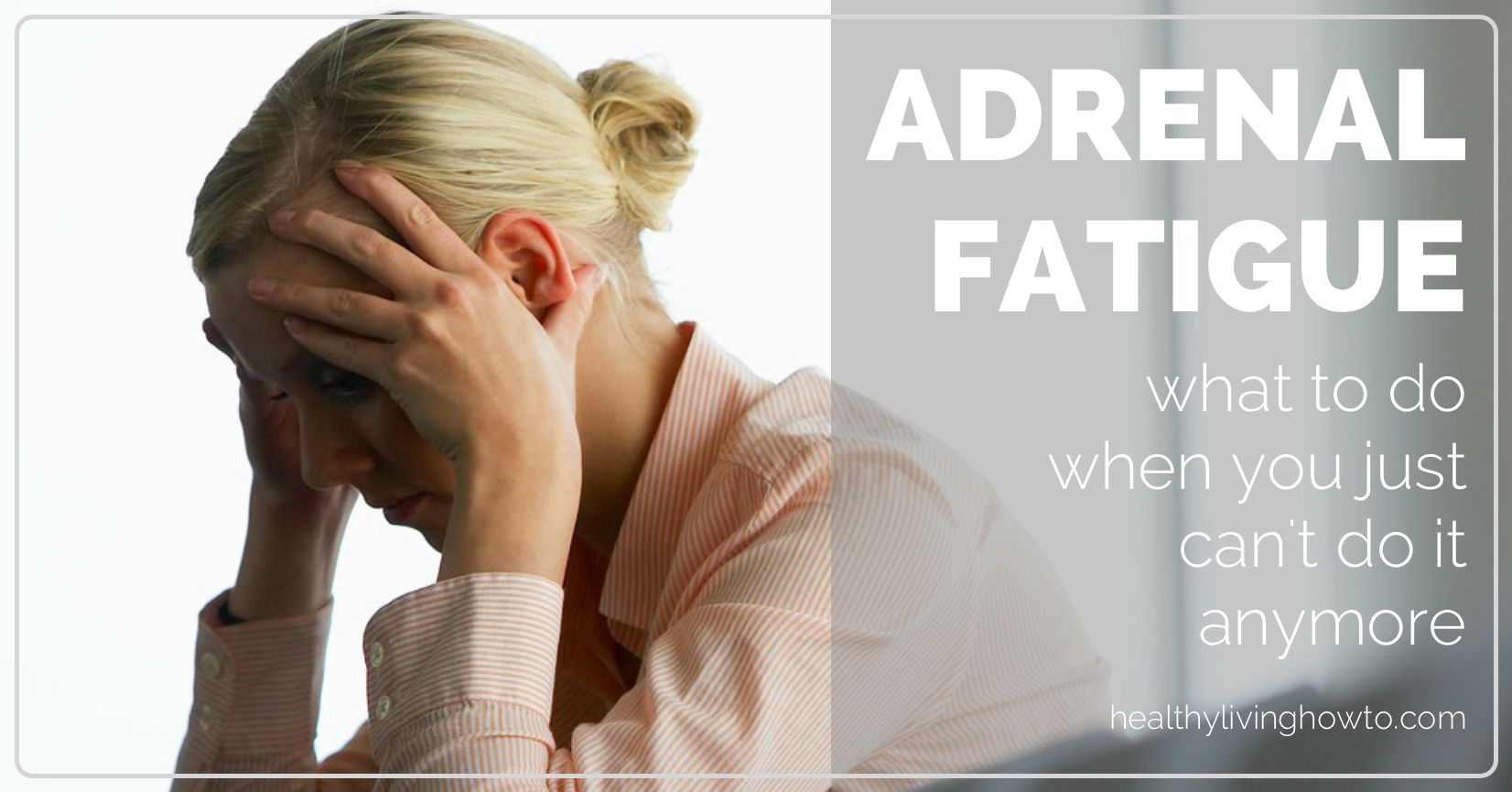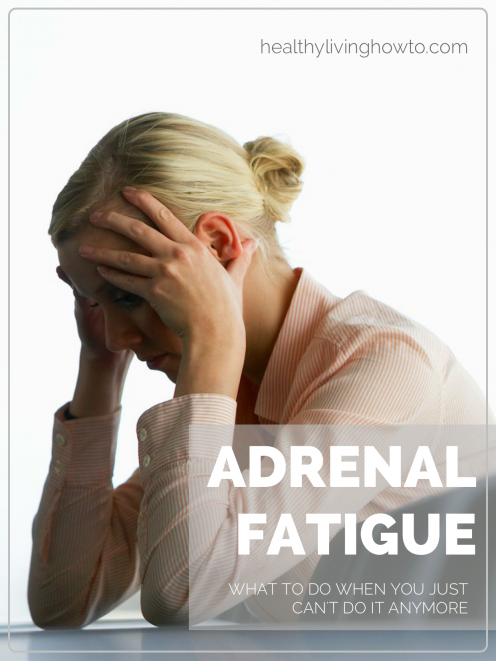The body’s reaction to stress is called the “stress response”. Without this finely tuned process, we would not be able to get through a day. However, our modern-day high-tech, fast-paced lifestyles have elevated stress to epidemic levels. Our lives have become littered with psychological, physical, nutritional and environmental stressors, which in turn assault our body with chronic levels of stress hormones. Initially, there is some ebb and flow, but eventually, when stress becomes chronic, stress hormones are continually produced and released into the bloodstream which can result in a condition called adrenal fatigue.
Adrenal Fatigue
- Do you suffer from all day fatigue?
- Are you dizzy upon rising and have low blood pressure?
- Are you depressed and have a flat affect to life?
- Do you abuse the snooze button, only to then rely on caffeine and sugar to get you through your day?
- Is exercise and recovery from exercise difficult for you?
- Do you suffer from low libido?
- Do you crave carbs, salt and sugar?
If this describes some or all of your symptoms, you are likely experiencing the effects of stress and even perhaps adrenal dysfunction or adrenal fatigue.
When the body is under any type of stress, cortisol the principal stress hormone, is released. When the body is under chronic stress, cortisol is elevated beyond normal circadian rhythms. If high cortisol levels are left untreated or ignored, the adrenal glands will eventually fatigue and decrease cortisol output. The resulting condition is known as adrenal fatigue and it can be debilitating to one’s health and quality of life.
Chronic stress and the resulting negative health issues are becoming a nationwide epidemic. It is estimated that 75-90% of chronic health conditions are related to stress and altered cortisol levels. The health risks associated with chronic stress include high blood pressure and cardiovascular disease, insulin resistance, increased risk of infections/lowered immunity, autoimmune diseases, thyroid dysfunction, inflammation, allergies, depression, sleep disturbances, and altered metabolism. As you can see chronic stress can wreak havoc on the body.
While the timeline may differ among individuals, the result is the same. The adrenals cry “uncle”, and your mental and physical health are compromised. While your adrenals might have given up, you should NOT, as adrenal dysfunction is reversible. It will take time and you will need patience, but the following nutrition, exercise and lifestyle guidelines can be crucial steps in your quest to take back your health!
![Adrenal Fatigue What To Do When You Just Can't Do It Anymore | healthylivinghowto.com Adrenal Fatigue What To Do When You Just Can't Do It Anymore | healthylivinghowto.com]() Adrenal Fatigue and Nutrition
Adrenal Fatigue and Nutrition
The overall nutrition recommendations are similar regardless of the stage of adrenal dysfunction. If you read my article on elevated cortisol levels, you will see some of the same nutrition recommendations. Regardless of the type of adrenal dysfunction, the nutrition plan should address the general healing of the adrenals.
A general rule in good nutrition is to focus on REAL food. Limit or avoid packaged, processed and non-organic foods. Additives, preservatives, GMOs, food dyes/colorings, hormones, pesticides, herbicides and antibiotics increase the toxic load to the liver and cause added stress to the body.
- Starches and sugars should be limited in order to regulate glucose metabolism. Sugar is an adrenal stressor and can further weaken adrenal function. The inclusion of starches and sugar in the diet will further exacerbate a negative hormone response causing taxation on the thyroid, metabolism, and immune system. Non-starchy vegetables, specifically those in the cruciferous family, due to their detoxifying ability, should be consumed three times as much as fruits and ideally be included at each meal.
- Protein, an integral macronutrient for healing, should be included at every meal to help with stabilizing blood sugar and improving immune function. Aim for organic proteins to limit hormones, antibiotics and inflammatory fats that are often found in non-organic meats.
- Healthy fats are essential for metabolism and the functioning of most systems in the body. Choose healthy, natural fats and avoid processed fats.
- Basic supplementation for optimal health includes a good quality multi-vitamin, omega-3 fish oils and probiotics. Additional vitamin C is recommended for its beneficial antioxidant properties in the presence of stress. Consult with a qualified practitioner for specific supplementation to both support and restore adrenal function.
Food sensitivities are often common with those diagnosed adrenal fatigue. Two of the most common sensitivities are gluten and dairy. Trying an elimination diet for a period of time of both gluten and dairy can provide symptom relief for many. Talk to your healthcare provider about food allergy/sensitivity blood testing for a more specific elimination approach.
Adrenal fatigue can also cause lower aldosterone levels. Aldosterone is a hormone released by the adrenals that is responsible for maintaining sodium balance. Simply stated, adrenal fatigue can cause lower sodium levels in the blood and thus one of the reasons cravings of salt are elevated. Adding Himalayan or Celtic sea salt to food/beverages helps clients with salt cravings and sodium balance. Adding Himalayan or Celtic salt post workouts is extremely beneficial to restore electrolyte balance.
Adrenal Fatigue and Exercise
Cortisol response is a protective mechanism of the body both during injury and to prevent injury. The normal and protective stress response during exercise is an increased release of cortisol, however this fails to occur with adrenal fatigue thus increasing injury risk. Additionally the stress of exercise can further exacerbate an already compromised immune system, thus increasing the risk of illness.
While many may not want to read this, less is more right now! The type of exercise as well as the duration and intensity during adrenal fatigue can cause injury and further damage.
Here are guidelines for those with adrenal fatigue. For more case specific recommendations, I suggest working with a certified personal trainer who has experience with adrenal dysfunction.
- Listen to your body, if you do not have the energy to start an exercise routine focus on nutrition and lifestyle until your adrenals start to heal. The length of your hiatus from exercise is case dependent.
- Recovery based activity such as light walking, gentle yoga, pilates and stretching is extremely important as they help to heal the adrenals and restore adrenal output.
- For those who do have the energy for exercise, limit cardio to less than 30 minutes (as cortisol should peak around 40 minutes) and no more than two times per week. As you progress in the healing process, interval training can be introduced.
- Resistance training should be light to start with minimal weight and increased rest times between sets. As you begin to heal, higher weights with lower repetitions can be introduced to help “wake up” the adrenals.
Adrenal Fatigue and Lifestyle
In order to decrease the impact stress has on our health, we first need to become aware of the common stressors. There are many ways stress can be categorized, but the important thing is to recognize how stress impacts the different areas of our life. Decreasing the stressors that led to adrenal fatigue, however, is easier said than done.
Focus on the variables in your life you can control to decrease stress and restore your health.
- Incorporate prayer, meditation, relaxation, breathing techniques and restorative type exercise such as yoga and pilates to help manage stress.
- Limit toxin exposure in household cleaners, pots and pans, plastic containers, makeup, and health and beauty aids. These toxins act as environmental stressors to the body.
- Utilize dry sauna as a way to detox the body from stress.
- Aim for 7-8 hours of sleep per night, ideally between 10pm-6am as sleep has natural healing and restorative properties.
Adrenal Fatigue and Your Cortisol Values
If you suspect you have adrenal fatigue or low cortisol levels, it is important to not only get your values tested via a 4-point salivary cortisol test, but to also consult with a qualified practitioner to ensure success on your healing journey.

